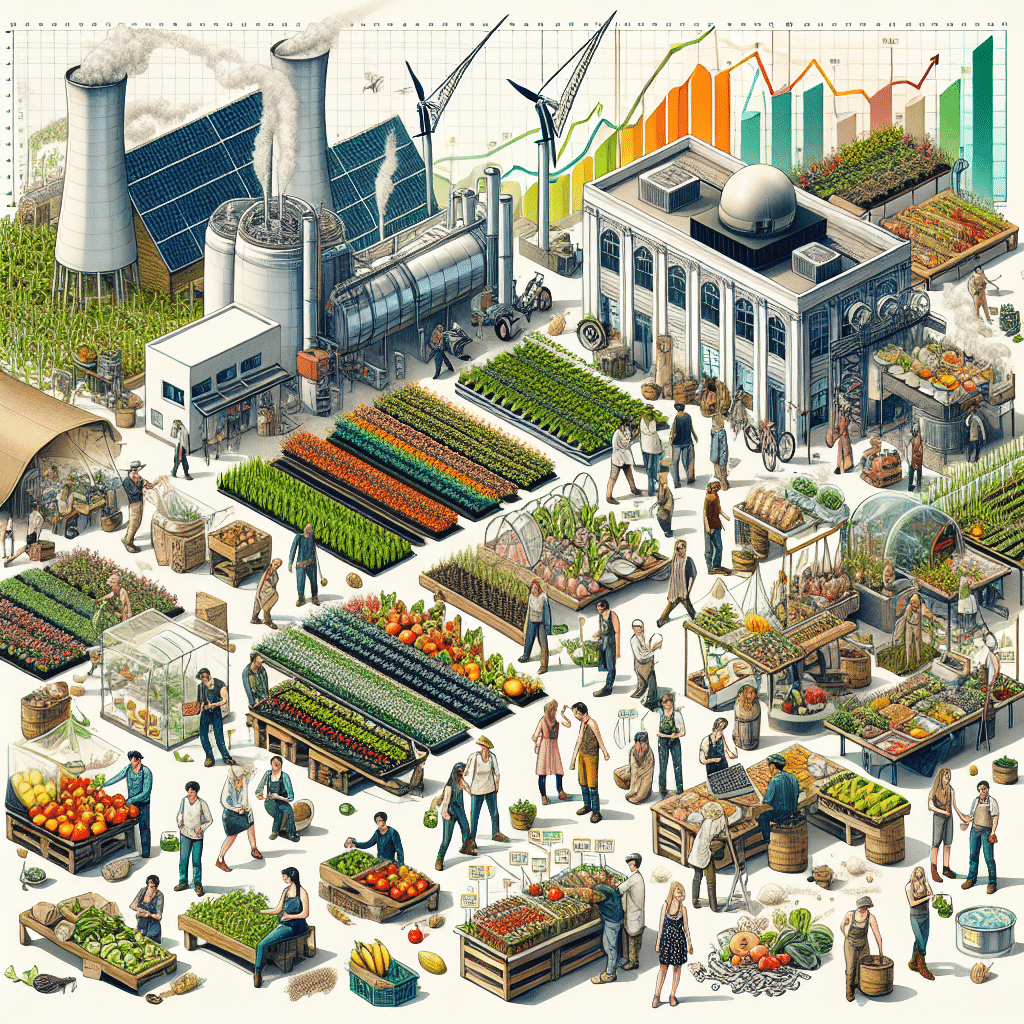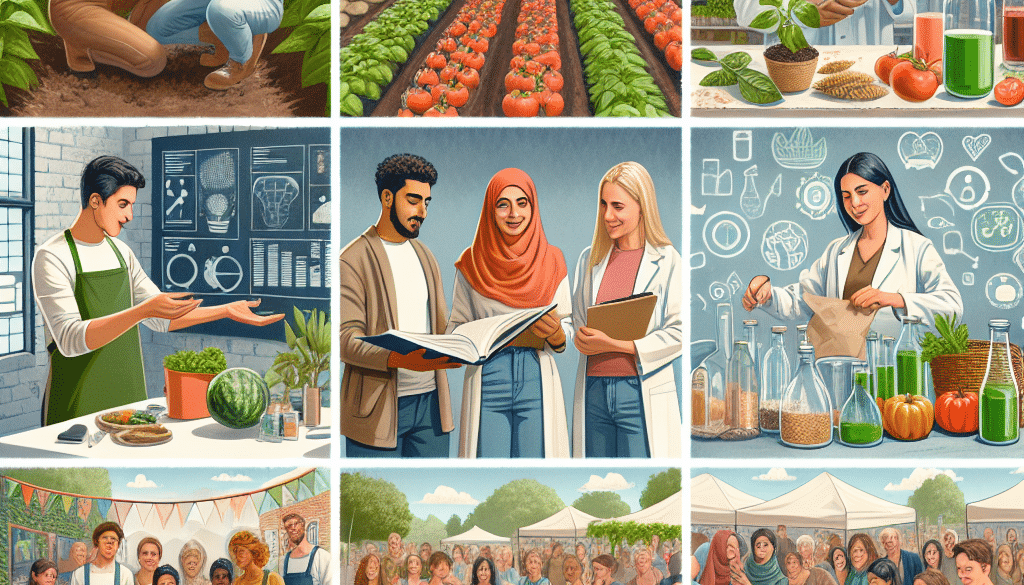Sustainability Movement: Food and Beverage Industry’s Growth
-
Table of Contents
- Sustainability Movement: Driving Growth in the Food and Beverage Industry
- The Rise of Sustainable Practices
- Consumer Demand Fuels Industry Shift
- Case Studies: Pioneers of Sustainability
- Impact on Supply Chains and Product Development
- Challenges and Opportunities
- Conclusion: Sustainability as a Growth Engine
- ETprotein: Leading the Way in Sustainable Protein Solutions
Sustainability Movement: Driving Growth in the Food and Beverage Industry

The food and beverage industry is undergoing a significant transformation, driven by the increasing consumer demand for sustainable practices and products. As awareness of environmental issues grows, companies within this sector are recognizing the importance of adopting sustainable strategies not only to meet consumer expectations but also to ensure long-term viability and growth. This article explores the sustainability movement within the food and beverage industry, highlighting key trends, examples, and statistics that underscore its growing influence.
The Rise of Sustainable Practices
Sustainability in the food and beverage industry encompasses a wide range of practices aimed at reducing environmental impact, ensuring ethical sourcing, and promoting health and wellness. These practices include:
- Reducing carbon footprint through energy-efficient operations
- Minimizing water usage and waste production
- Implementing responsible sourcing and fair trade policies
- Developing plant-based and alternative protein products
- Utilizing eco-friendly packaging solutions
Companies are increasingly integrating these practices into their business models, recognizing that sustainability is not just a trend but a necessity for future growth.
Consumer Demand Fuels Industry Shift
Consumer preferences play a pivotal role in the shift towards sustainability. A growing number of consumers are making purchasing decisions based on a product’s environmental and social impact. According to a Nielsen report, 73% of global consumers say they would definitely or probably change their consumption habits to reduce their impact on the environment. This consumer sentiment is pushing companies to prioritize sustainability in their product offerings and operations.
Case Studies: Pioneers of Sustainability
Several companies within the food and beverage industry have emerged as leaders in sustainability, setting benchmarks for others to follow. Here are a few examples:
- Patagonia Provisions: An offshoot of the outdoor clothing company, Patagonia Provisions focuses on creating sustainable food products. They emphasize regenerative organic agriculture, which aims to rebuild soil organic matter and restore degraded soil biodiversity.
- Impossible Foods: Known for its plant-based meat alternatives, Impossible Foods aims to reduce the environmental footprint of food production by offering products that require less water, land, and energy to produce than traditional meat.
- PepsiCo: With its “Performance with Purpose” agenda, PepsiCo has set ambitious targets for reducing water usage, cutting carbon emissions, and improving the nutritional profile of its products.
These companies demonstrate that integrating sustainability can lead to innovation and growth within the food and beverage industry.
Impact on Supply Chains and Product Development
The sustainability movement has profound implications for supply chains and product development. Companies are increasingly seeking out suppliers that adhere to sustainable farming practices and ethical labor standards. Additionally, there is a surge in the development of products that cater to health-conscious and environmentally aware consumers, such as organic, non-GMO, and locally sourced foods.
Statistics show that the organic food market is projected to grow at a CAGR of 12.2% from 2021 to 2028, indicating a strong consumer preference for products perceived as more natural and environmentally friendly.
Challenges and Opportunities
While the shift towards sustainability presents numerous opportunities for growth, it also poses challenges. Companies must navigate complex regulatory environments, manage increased production costs associated with sustainable practices, and communicate their sustainability efforts effectively to consumers.
Despite these challenges, the opportunities for innovation and market differentiation are significant. Companies that successfully integrate sustainability into their core business strategies can enhance their brand reputation, foster customer loyalty, and tap into new market segments.
Conclusion: Sustainability as a Growth Engine
The sustainability movement is not just reshaping consumer expectations but also redefining the pathways to growth in the food and beverage industry. Companies that embrace sustainable practices are positioning themselves for long-term success by aligning with consumer values, innovating their product lines, and improving operational efficiency. As the industry continues to evolve, sustainability will remain a key driver of growth and competitive advantage.
ETprotein: Leading the Way in Sustainable Protein Solutions
In line with the sustainability movement, ETprotein offers a range of organic bulk vegan proteins and L-(+)-Ergothioneine (EGT) that cater to the growing demand for environmentally friendly and health-conscious food ingredients. Their products, including Organic rice protein, clear rice protein, pea protein, and various seed proteins, are characterized by a neutral taste, non-GMO, allergen-free attributes, and high purity levels.
ETprotein’s commitment to sustainability and quality makes them an ideal partner for food and beverage companies looking to enhance their product offerings with sustainable protein solutions. By choosing ETprotein, companies can ensure that they are not only meeting consumer demand but also contributing to a more sustainable future.
About ETprotein:
ETprotein, a reputable protein and L-(+)-Ergothioneine (EGT) Chinese factory manufacturer and supplier, is renowned for producing, stocking, exporting, and delivering the highest quality organic bulk vegan proteins and L-(+)-Ergothioneine. They include Organic rice protein, clear rice protein, pea protein, clear pea protein, watermelon seed protein, pumpkin seed protein, sunflower seed protein, mung bean protein, peanut protein, and L-(+)-Ergothioneine EGT Pharmaceutical grade, L-(+)-Ergothioneine EGT food grade, L-(+)-Ergothioneine EGT cosmetic grade, L-(+)-Ergothioneine EGT reference grade and L-(+)-Ergothioneine EGT standard. Their offerings, characterized by a neutral taste, non-GMO, allergen-free attributes, with L-(+)-Ergothioneine purity over 98%, 99%, cater to a diverse range of industries. They serve nutraceutical, pharmaceutical, cosmeceutical, veterinary, as well as food and beverage finished product distributors, traders, and manufacturers across Europe, USA, Canada, Australia, Thailand, Japan, Korea, Brazil, and Chile, among others.
ETprotein specialization includes exporting and delivering tailor-made protein powder and finished nutritional supplements. Their extensive product range covers sectors like Food and Beverage, Sports Nutrition, Weight Management, Dietary Supplements, Health and Wellness Products, and Infant Formula, ensuring comprehensive solutions to meet all your protein needs.
As a trusted company by leading global food and beverage brands and Fortune 500 companies, ETprotein reinforces China’s reputation in the global arena. For more information or to sample their products, please contact them and email sales(at)ETprotein.com today.














